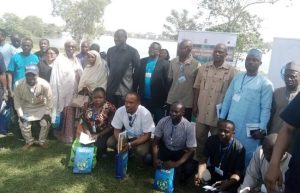United Nations Industrial Development Organisation (UNIDO) and the Abuja Environmental Protection Board (AEPB) on Thursday, November 30, 2023, in Abuja collaborated for a sustainable plastic value chain through circular economy practices to mitigate climate change.

Dr Fred Kpakol, Senior Special Assistant on Environment to Mr Nyesom Wike, the Federal Capital Territory Administration (FCTA) Minister, said this at a seminar on promoting sustainable plastic value chain through circular economy practices.
Kpakol, who was represented by Mr Osi Braimah, Director of Abuja Environmental Protection Board (AEPB), said that the FCT administration would continue to support the plastic wastes project for a sustainable environment.
He said that one of the problems of plastic pollution could be solved through the advocacy approach, raising awareness towards better use and disposal of plastics in Abuja and Nigeria.
“In FCT, the issue of plastic wastes has become a national discuss and deserves urgent and very prompt solution,” Kpakol said.
He said that UNIDO, in collaboration with the government of Japan and the Federal Ministry of Environment, had signed and started the implementation of the project promoting sustainable waste plastics value chains through circular economy practices since Oct. 2022.
“They have chosen three agencies in Nigeria which are Lagos State Environmental Protection Agency (LASEPA), the Lagos Waste Management Authority (LAWMA) and AEPB for project implementation.”
In his speech, Mr Olubunmi Olusanya, Director of Pollution Control and Environmental Health, Federal Ministry of Environment, said that plastic wastes collection is a global issue.
Olusanya, who was represented by Mr Dangiwa Orume, Assistant Director on Solid Waste Management in the Ministry, said that the issue of plastic pollution has effect on health and ecosystem.
He said that the issue of plastic economy has gained significant attraction in recent years, saying that the concept of circular economy is to minimise waste and maximise the value of resources by putting materials in use for as long as possible.
Mr Benjamin Enwerem, Director of Solid Waste Management North, AEPB, said that Jabi was chosen for the plastic project because there are mixed settlements in the area.
“Settlements such as business institutions, organised settlements villages, commercial centres, schools and offices and so on.
“So, in this project we are going to target both formal and informal settlements around Jabi for plastic recycling,” Enwerem said.
Ms Nahomi Nishio, Project Manager, UNIDO, urged private sectors to collaborate on the plastic wastes management project.
Nishio said that the seminar was more about awareness raising on plastic recycling and reuse.
By Abigael Joshua
